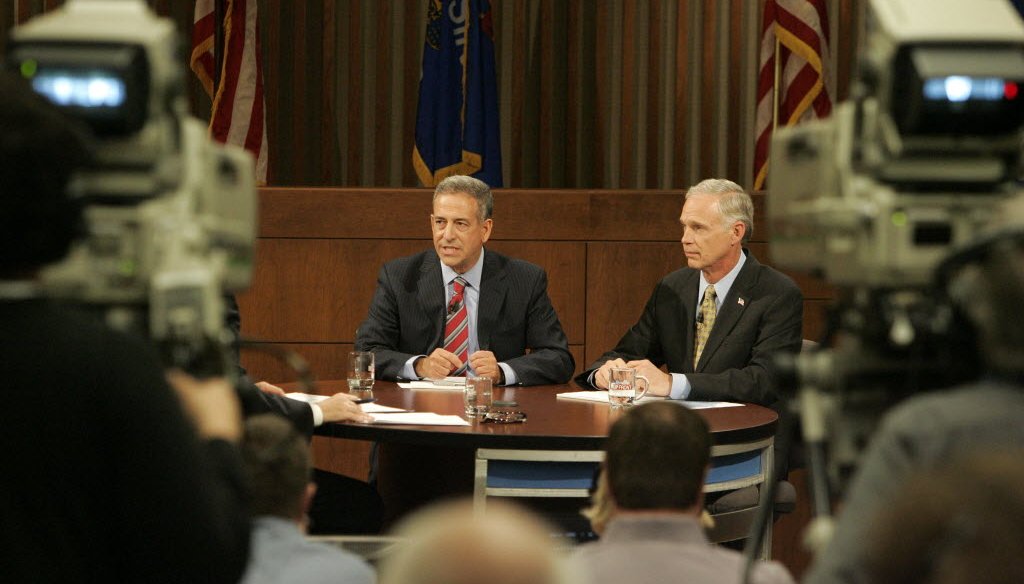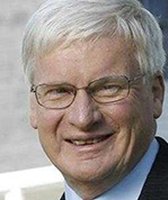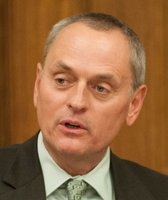Stand up for the facts!
Our only agenda is to publish the truth so you can be an informed participant in democracy.
We need your help.
I would like to contribute

Democrat Russ Feingold (left) has announced a 2016 U.S. Senate run against the man who ousted him in 2010, U.S. Sen. Ron Johnson (right). They are shown in this Milwaukee Journal Sentinel file photo at a 2010 debate.
It’s here, Johnson vs. Feingold II, and you won’t even need pay-per-view to see it.
If the 2016 U.S. Senate rematch mimics the 2010 race in which Republican businessman Ron Johnson upset Democrat incumbent Russ Feingold, it will be a no-holds-barred affair.
We’ve tested a variety of claims by -- and about -- the two on the Truth-O-Meter. Here’s a look at some of the highlights:
Battle of biographies
"There are 100 members of the U.S. Senate. Fifty-seven of them, including Russ Feingold, are lawyers. There are zero manufacturers and one accountant."
Johnson made the claim, and we rated it Mostly True.
As of 2010, at least two members had a manufacturing background and two an accounting background, but Johnson’s central point was on target.
Ron Johnson "likes to say there are too many lawyers in the Senate – 57. He’d be the 70th millionaire."
True, we said of Feingold’s counter-claim.
By our calculations, and those of the Center for Responsive Politics, Feingold was right. If anything, the methodology underestimates a person’s net worth -- and therefore may have undercounted the actual millionaires in the body at the time.
Russ Feingold "has not worked anywhere outside of politics."
We rated Johnson’s claim False. Feingold worked as an attorney on litigation and had business clients, a point supported by attorneys who worked at the two law firms at the time.
Ron Johnson’s company got government loans and a grant to help expand his business
We rated this claim from a Feingold TV ad Half True. Johnson’s Oshkosh manufacturing firm got government aid, but the grant apparently predated Johnson’s arrival in Oshkosh, and there is no evidence that Johnson was involved in it.
Size and role of government
"Nobody in total is proposing cutting anything. We’re trying to reduce the rate of growth in government."
Johnson was in office more than two years when he claimed this. We rated it Mostly True.
Our conclusion: "While Johnson supports deep cutbacks in some budget areas, he and fellow Republicans repeatedly have made clear that in Washington budget-speak -- which typically covers 10-year increments -- they are talking about limiting the size of future spending increases."
Ron Johnson is "willing to hand over the Great Lakes to the oil companies."
We rated Feingold’s claim Mostly False.
Johnson came out for more oil exploration, without excluding the Great Lakes. But the day before Feingold’s TV ad started, Johnson clarified that he opposed Great Lakes drilling.
Entitlement programs
Russ Feingold voted to give Social Security benefits to illegal immigrants
Johnson hammered hard on this one, but we rated it False. The 2006 amendment cited by Johnson, which Feingold did oppose, would not have prevented illegal immigrants from receiving Social Security benefits. They already were barred.
"Russ Feingold cut Medicare by $523 billion."
We rated Johnson’s claim Mostly False.
Johnson said Feingold supported a measure that cut more than $500 billion from Medicare. That makes it sound like money out of the Medicare budget today, when Medicare spending will actually increase over the next 10 years.
We concluded that what Johnson labels a cut is an attempt to slow the projected increase in spending by $500 billion. Under the plan, guaranteed benefits are not cut. In fact, some benefits are increased.
Foreign policy
Before the terrorist attacks in Benghazi, "the State Department not only failed to honor repeated requests for additional security, but instead actually reduced security in Libya."
This was a Johnson claim from 2014, when he was criticizing then-Secretary of State Hillary Clinton over the 2012 attack that that killed U.S. Ambassador Chris Stevens and three other Americans.
We rated his claim True.
State Department headquarters in Washington did refuse repeated requests from its ambassador in Libya for more security personnel. And it decided not to accept an offer from the Defense Department to extend the stay of one of its security units in Libya, reducing the level of security that was available.
Health care
"A majority of Wisconsinites opposed the government takeover of health care. But Russ Feingold voted for it anyway."
We rated Johnson’s campaign claim False.
Johnson mischaracterized the question in a poll -- and what Feingold voted for. Johnson’s ad said a "majority of Wisconsinites" were opposed. But the more timely state polls measured only likely voters, not the entire adult population. The broadest poll we found -- measuring the view of Wisconsin adults -- was older, but it did not find a majority in opposition.
Our Sources
Truth-O-Meter items, as noted.















































